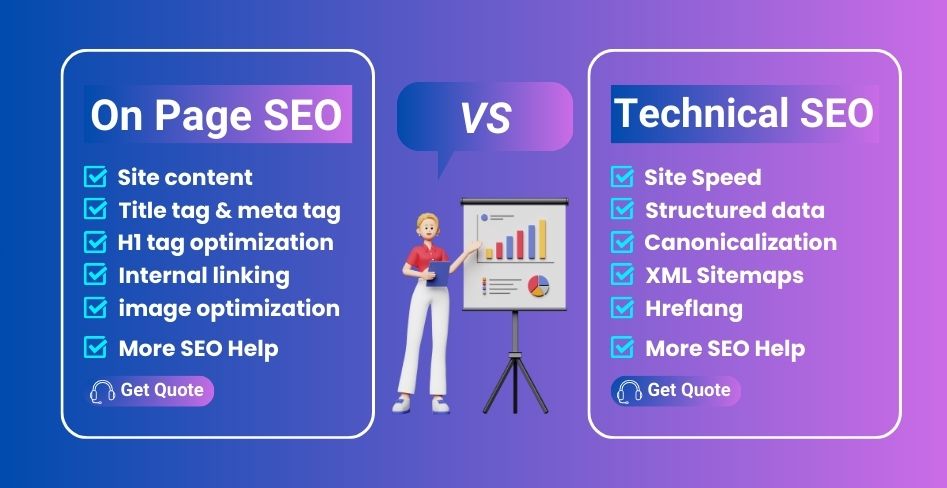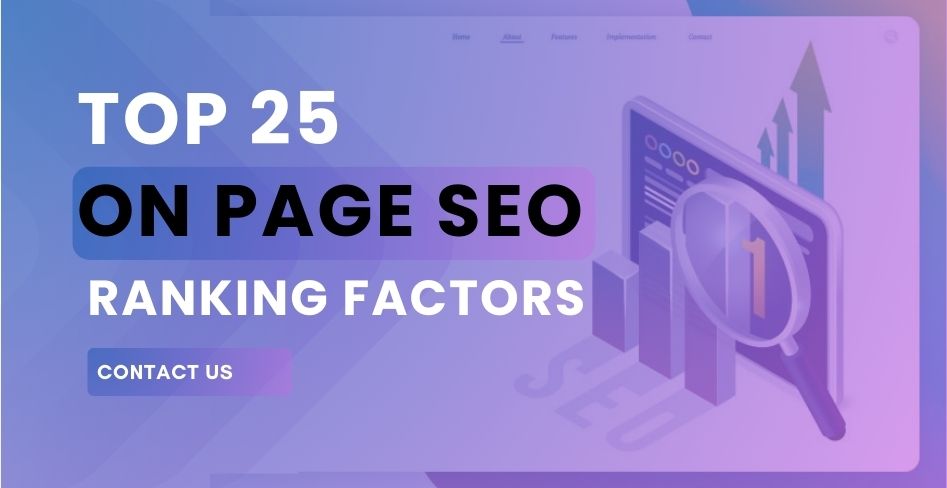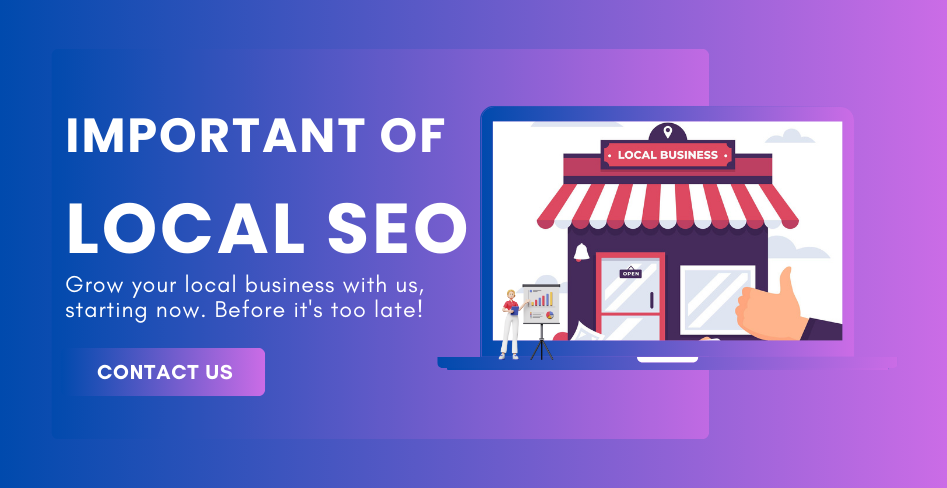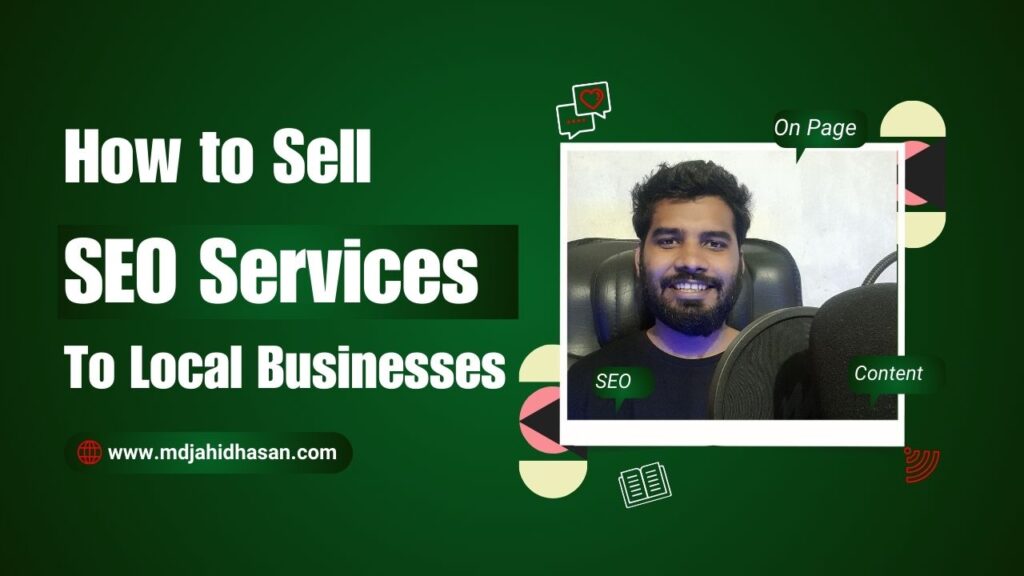On Page SEO VS Technical SEO You Need to Know

On-Page SEO vs Technical SEO Differences and Implementation Strategies Search Engine Optimization (SEO), two crucial components stand out: On-Page SEO and Technical SEO. While both are integral to improving a website’s search engine rankings, they operate in distinct ways. Understanding the disparities and implementation strategies of On-Page SEO and Technical SEO is vital for any digital marketer or website owner aiming to enhance online visibility and drive organic traffic. What is On-Page SEO? On-page SEO refers to the optimization efforts made directly on the website’s pages to improve its search engine rankings and attract relevant organic traffic. It involves optimizing content, HTML source code, and various elements visible to users. Key aspects of On-Page SEO include: Keyword Optimization: Strategic placement of relevant keywords throughout the content, meta tags, and headings to signal the topic and relevance of the page to search engines. High-Quality Content: Creating engaging, informative, and original content that satisfies user intent and provides value, thereby increasing dwell time and reducing bounce rates. Title Tags and Meta Descriptions: Writing compelling title tags and meta descriptions containing target keywords to enhance click-through rates. URL Structure: Ensuring that URLs are concise, descriptive, and contain target keywords to enhance readability and crawlability. Internal Linking: Establishing a network of internal links to guide users and search engine crawlers to relevant pages within the website. Image Optimization: Optimizing images with descriptive file names, alt tags, and appropriate sizes to improve user experience and search engine crawlability. What is Technical SEO? Technical SEO focuses on optimizing the technical aspects of a website to improve its search engine visibility and ensure smooth crawling and indexing by search engine bots. It deals with the backend elements that affect website performance and accessibility. Key components of Technical SEO include: Website Speed Optimization: Improving page load times through techniques such as image optimization, minification of CSS and JavaScript files, and leveraging browser caching. Mobile-Friendliness: Ensuring that the website is responsive and renders effectively on various devices, particularly mobile phones, to cater to the increasing number of mobile users. XML Sitemap: Creating and submitting XML sitemaps to search engines to help them understand the website structure and index pages efficiently. Robots.txt File: Configuring the robots.txt file to control search engine crawlers’ access to specific areas of the website. Schema Markup: Implementing structured data markup to provide search engines with additional context about the website’s content and enhance rich snippets in search results. Crawlability and Indexability: Removing crawl errors, optimizing robots.txt files, and implementing XML sitemaps to facilitate efficient crawling and indexing by search engine bots. Site Structure and Navigation: Organizing site structure hierarchically, optimizing internal linking, and implementing breadcrumb navigation for enhanced user experience and crawlability. Why do we need technical SEO and on-page seo? Technical SEO and On-Page SEO serve different yet equally important purposes in optimizing a website for search engines. Here’s why both are necessary: Comprehensive Optimization: Technical SEO and On-Page SEO together provide a holistic approach to website optimization. While On-Page SEO focuses on optimizing content and HTML elements visible to users, Technical SEO addresses backend aspects that affect website performance and accessibility. By implementing both, you ensure that your website is fully optimized for search engines and provides a seamless user experience. Improved Search Engine Rankings: Search engines consider both content relevance and website usability when ranking pages. On-page SEO ensures that your content is relevant, engaging, and optimized for target keywords, which helps improve your rankings for specific search queries. Technical SEO, on the other hand, ensures that search engine crawlers can easily access and index your website’s content, leading to better visibility in search results. Enhanced User Experience: Technical SEO optimizations such as improving site speed, implementing mobile-friendliness, and ensuring proper site structure contribute to a better user experience. A fast-loading, mobile-responsive website with intuitive navigation enhances user satisfaction and encourages longer dwell times, ultimately leading to higher rankings and increased organic traffic. Crawlability and Indexability: Technical SEO optimizations such as XML sitemaps, robots.txt configuration, and canonical tags help search engine crawlers navigate and understand your website’s structure. This ensures that all relevant pages are crawled and indexed properly, preventing issues like duplicate content and crawl errors that could negatively impact your rankings. Long-Term Sustainability: Both Technical SEO and On-Page SEO lay the foundation for long-term success in search engine rankings. Technical SEO optimizations improve the overall health and performance of your website, making it more resilient to algorithm updates and changes in search engine guidelines. On-page SEO optimizations help create valuable, high-quality content that continues to attract organic traffic and engagement over time. Key Differences Between On-Page SEO and Technical SEO: While both On-Page SEO and Technical SEO aim to improve a website’s search engine visibility, they differ in their focus and implementation: Focus: On-page SEO focuses on optimizing content and HTML elements directly visible to users. Technical SEO concentrates on improving website infrastructure and backend elements to enhance crawling, indexing, and site performance. Implementation: On-page SEO implementation involves content creation, keyword optimization, and internal linking within the website. Technical SEO implementation requires addressing issues related to site speed, mobile-friendliness, XML sitemaps, and structured data markup. On-Page SEO Implementation: Effective On-Page SEO implementation involves: Conducting keyword research to identify relevant target keywords. Creating high-quality, informative content optimized around target keywords. Optimizing title tags, meta descriptions, and URLs for improved click-through rates and relevance. Implementing internal linking to establish a logical website structure and distribute link equity. Optimizing images with descriptive filenames and alt tags. Technical SEO Implementation: Successful Technical SEO implementation includes: Optimizing site speed by minimizing CSS and JavaScript files, optimizing images, and leveraging browser caching. Ensuring mobile-friendliness by using responsive design and optimizing viewport settings. Generating and submitting XML sitemaps to search engines and monitoring crawl errors. Configuring the robots.txt file to control search engine crawler access and prevent crawling of irrelevant pages. Implementing schema markup to provide search engines with structured data about the website’s content. Conclusion: On-page SEO and Technical SEO are integral components of a
Top 25 On Page SEO Ranking Factors You Need to Know

Unlocking the Power of On-Page SEO Ranking Factors: A Comprehensive Guide In the ever-evolving landscape of search engine optimization (SEO), on page SEO factors remain a cornerstone of achieving high rankings in search engine results pages (SERPs). From crafting compelling content to optimizing technical elements, mastering on-page SEO is essential for enhancing your website’s visibility and attracting organic traffic. In this guide, we delve into the fundamental on-page SEO factors and explore actionable strategies to propel your website to the forefront of search engine results. Understanding On-Page SEO On-page SEO encompasses a range of practices aimed at optimizing individual web pages to improve their search engine rankings and drive relevant traffic. Unlike off-page SEO, which focuses on external factors like backlinks and social signals, on-page SEO revolves around optimizing elements directly within the website itself. By fine-tuning various on-page elements, you can signal to search engines the relevance, quality, and authority of your content, thus enhancing your chances of ranking prominently for targeted keywords. Key On Page SEO Ranking Factors 1. High-Quality Content Compelling, informative, and relevant content lies at the heart of successful on-page SEO. Search engines prioritize content that provides genuine value to users, so aim to create comprehensive, well-researched, and engaging content that addresses the needs and interests of your target audience. Incorporate targeted keywords naturally within your content while maintaining readability and coherence. 2. Keyword Optimization Strategic keyword optimization is vital for on-page SEO success. Conduct thorough keyword research to identify relevant terms and phrases with adequate search volume and moderate competition. Integrate these keywords strategically into your titles, headings, meta descriptions, and body content to signal the topic and relevance of your page to search engines. 3. Title Tags and Meta Descriptions Craft compelling title tags and meta descriptions that accurately reflect the content of your web pages while enticing users to click through from the search results. Include primary keywords naturally within these elements to improve their visibility and relevance to search queries. Keep your titles concise (under 60 characters) and meta descriptions informative yet concise (under 160 characters) to optimize for both search engines and user experience. 4. URL Structure Optimize your URL structure to make it descriptive, user-friendly, and keyword-rich. Clear, concise URLs that include targeted keywords can enhance the visibility and click-through rates of your pages in search results. Avoid lengthy, cryptic URLs with unnecessary parameters or dynamic strings, and utilize hyphens to separate words for improved readability. 5. Header Tags (H1, H2, etc.) Utilize header tags (H1, H2, H3, etc.) effectively to structure your content and signal its hierarchy to search engines. The H1 tag should typically contain the primary keyword and provide a concise summary of the page’s content, while subsequent header tags can be used to organize subtopics and sections. Incorporating keywords naturally within header tags can help reinforce the relevance and topical focus of your content. 6. Optimized Images and Alt Text Enhance the SEO value of your web pages by optimizing images with descriptive filenames, relevant alt text, and appropriate captions. Alt text provides textual context to search engines, enabling them to understand the content and purpose of images. Incorporate targeted keywords naturally within alt attributes to improve image search visibility and accessibility for users with disabilities. 7. Internal Linking Implement a strategic internal linking strategy to connect related pages within your website and distribute link equity effectively. Internal links help search engines discover, crawl, and index your content more efficiently, while also establishing topical relevance and authority across your site. Incorporate descriptive anchor text containing relevant keywords to provide context and guide users to relevant resources or pages. 8. User Experience (UX) Optimization Prioritize user experience by optimizing page load speed, mobile responsiveness, and overall site performance. Search engines consider factors such as bounce rate, dwell time, and mobile-friendliness when evaluating the quality and relevance of web pages. Ensure intuitive navigation, clear calls-to-action, and a seamless browsing experience to enhance engagement and satisfaction among your site visitors. 9. Schema Markup Implement structured data markup (schema.org) to provide search engines with additional context and metadata about your content. Schema markup helps search engines understand the meaning and relationships between different elements on your page, which can lead to enhanced visibility in rich snippets, knowledge graphs, and other SERP features. Leverage schema markup to highlight key information such as reviews, ratings, events, and FAQs. 10. Content Freshness and Updates Regularly update and refresh your content to reflect the latest information, trends, and developments in your industry or niche. Fresh, up-to-date content signals relevance and authority to search engines, potentially leading to higher rankings and increased visibility over time. Monitor performance metrics and user feedback to identify opportunities for optimization and refinement across your website. Conclusion Mastering the art of on-page SEO is essential for maximizing your website’s visibility, relevance, and authority in search engine results. By focusing on high-quality content creation, strategic keyword optimization, and meticulous attention to on-page elements, you can elevate your website’s rankings and attract organic traffic from your target audience. Incorporate the aforementioned on-page SEO ranking factors into your optimization efforts, and continually monitor and adapt your strategies to stay ahead in the competitive landscape of search engine optimization.
Why Local SEO is Important For Small Business

Why Local SEO is Important For Small Business Local SEO (Search Engine Optimization) emerges as a pivotal strategy for small businesses seeking to establish an impotent online local business within their immediate community. This complete guide will delve into the importance of Local SEO and how it can propel small businesses to higher success. What is Local SEO in Digital Marketing? Local business SEO (Search Engine Optimization) encompasses a set of strategies and techniques designed to enhance a business’s visibility in local search engine results. It involves optimizing various online elements to ensure that a business appears famous when users search for products or services within a specific local area. People don’t like Traditional SEO, which focuses on improving a website’s visibility on a global ranking, local Search Engine Optimization helps local customers. Who is actively seeking nearby businesses? Why Local SEO is Important For Small Businesses? Local business SEO is essential for small businesses because it helps them connect with nearby customers. Who is actively searching for products or services in their area? By optimizing their online business for local searches, Businesses can improve their targetd visibility in local search results, increase foot traffic to their physical locations, and ultimately boost sales and revenue. With the rise of mobile searches and “near me” queries, investing in local business SEO has become essential for small businesses to stay competitive in their local market. Here are some topics to share with you guys: Improve Your Website: Local area SEO efforts affect optimizing your website’s content, web design, content structure, and metadata to align with local search queries, thus improving its overall quality and relevance. Increase Web Traffic: By targeting local keywords and optimizing for local search intent, businesses can attract more organic traffic to their websites from users in their local area. Increased Visibility: Local area SEO tactics such as claiming and optimizing Google My Business listings, offering to local directories, and developing local citations help businesses become more visible in local search results. Local Visibility: For small businesses operating in a specific geographic area, local area SEO is essential for achieving visibility among local clients. Who is more likely to convert into customers? Increased Sales: Improved visibility and accessibility in local search results increase into more foot traffic, phone calls, and online inquiries, ultimately leading to increased sales and revenue for small businesses. Brand Awareness: Essential local area SEO efforts not only data drive traffic and sales but also contribute to building brand awareness and credibility within the local area. How Does Local SEO Help to Grow Small Businesses? Localized SEO aids small businesses in several ways. Build Your Brand: SEO establishes a digital online business for small businesses within their local community, contributing to brand recognition and trust among local consumers. Grow Your Business: Attracting more local customers and growing your local audience base, SEO provides opportunities for business growth and expansion into new markets. Increase Your Sales: The enhanced visibility and accessibility provided by Local (Search Engine Optimization) SEO results in more leads, conversions, and sales for small businesses. Improve Your Rank: By optimizing various on-page and off-page elements, businesses can improve their rankings in local search results, outranking competitors and attracting more customers. Targeted Audience: Local search engine optimization allows businesses to target local areas, interests, and behaviors of local consumers, ensuring that marketing efforts are highly relevant and successful for local businesses. User Experience: A well-executed Local SEO strategy enhances the user experience by providing accurate and up-to-date information, easy navigation, and a seamless online shopping experience, leading to improved customer satisfaction and commitment. How to Create a Winning Local Business SEO Content Strategy Creating a winning local (Search Engine Optimization) SEO content strategy involves a combination of understanding your target audience, optimizing your local website and content for local relevance, and engaging with your residents. Here’s a step-by-step guide to help you develop an effective local Search Engine Optimization content strategy: Keyword Research: Identify relevant local keywords that reflect the products, services, and geographic locations your target audience is searching for. Competitor Analysis: Analyze competitors’ Local Search Engine Optimization strategies to identify strengths, weaknesses, and opportunities for improvement. Local Content Creation: Create informative and engaging content tailored to the interests and needs of your local audience, incorporating relevant local keywords and topics. On-Page Content: On-page content optimization elements such as local keyword import, title tags, meta descriptions, headings, body content, internal linking, external linking, and image optimization, with local keywords and geographic modifiers. Technical SEO: Ensure that ”your local website” is technically sound and optimized for mobile devices, page speed, site structure, broken links, and schema markup. Link Building Strategy: Build high-quality backlinks from local websites, directories, and industry-specific platforms to improve your website’s authority and visibility in local search results. Google My Business Creation: Claim and optimize your Google My Business listing with accurate business information, photos, videos, and customer reviews to enhance your visibility in Google Maps and local search results. Build Local Citations: Get listed on local directories, review sites, and online platforms relevant to your industry to increase your business’s online presence and credibility. Managing Online Reviews: Encourage satisfied customers to go to positive reviews on Google Maps, Yelp, Facebook, and other review platforms, and promptly address any negative feedback to maintain a positive online reputation. Which Businesses Are Likely to Benefit from Local SEO Practices? Local Search Engine Optimization practices are particularly beneficial for small businesses operating in service-based industries such as: Professional Services (e.g., lawyers, accountants, consultants) Plumbers Home Painting Services Flooring Companies Retail Stores (boutiques, local shops) Pet Services (pet grooming, pet sitting) Real Estate Agencies Restaurants Interior Design Fitness Centers and Gyms Conclusion: Ready to harness the power of local Search Engine Optimization to grow your small business? Implement these strategies today and watch as your local business grows among your targeted local areas!
How to Successfully Sell SEO Services to Local Businesses You Need to Know

How to Successfully Sell SEO Services to Local Businesses Digital search engine optimization age, having strong online branding is essential for the success of any business, especially local ones. Search Engine Optimization (SEO) plays a pivotal role in helping businesses improve their visibility and attract potential customers. However, convincing local businesses of the importance of SEO and selling them your services can be challenging without the right approach. In this comprehensive guide, we’ll explore effective strategies on how to sell SEO services to local businesses, ensuring mutual benefits and long-term success. Understanding the Local Business Landscape: Before diving into selling SEO services, it’s essential to understand the local business landscape. Conduct thorough research to identify the specific needs, challenges, and goals of local businesses in your target area. Consider factors such as industry trends, competition, target audience demographics, and current online presence. Preparing a Compelling Value Proposition: One of the keys to selling SEO services successfully is to articulate a compelling value proposition tailored to the needs of local businesses. Highlight the tangible benefits of SEO, such as increased website traffic, higher search engine rankings, enhanced brand visibility, and ultimately, more customers and revenue. Emphasize how investing in SEO can provide a competitive edge and long-term growth opportunities for their business. Educating Local Businesses about SEO: Many local businesses may not fully understand the intricacies of local SEO or its potential impact on their online presence. As an SEO service provider, it’s crucial to educate them about the fundamentals of SEO, including Keyword research. On-page optimization, Technical SEO. Link building. Content creation. Use clear and jargon-free language to explain how each aspect of SEO contributes to improving their website’s visibility and driving organic traffic. Providing Case Studies and Success Stories: One of the most effective ways to convince local businesses of the value of SEO is by providing concrete evidence of its effectiveness. Share case studies and success stories of other local businesses that have benefited from your SEO services. Highlight specific results, such as: Increased website traffic. Higher conversion rates. Improved search engine rankings. Seeing real-life examples of successful SEO campaigns can instill confidence and trust in potential clients. Offering Customized Solutions: Every local business is unique, with its own set of goals, challenges, and target audience. Instead of offering one-size-fits-all SEO packages, tailor your services to meet the specific needs and objectives of each client. Conduct a comprehensive website audit and SEO analysis to identify areas for improvement and develop a customized strategy that aligns with their goals and budget. Building Trust and Credibility: Trust is a critical factor in selling SEO services to local businesses. Demonstrate your expertise and credibility by showcasing your industry knowledge, relevant experience, and track record of success. Provide transparent pricing, timelines, and deliverables, and be honest about what your services can realistically achieve. Building trust-based relationships with clients fosters long-term partnerships and referrals. Offering Ongoing Support and Communication: SEO is an ongoing process that requires continuous monitoring, optimization, and adaptation to changes in search engine algorithms and industry trends. Assure local businesses that you’ll provide ongoing support, regular progress reports, and open communication throughout the duration of your partnership. Being responsive to their questions, concerns, and feedback demonstrates your commitment to their success. Conclusion: Selling SEO services to local businesses requires a strategic approach that emphasizes education, customization, trust-building, and ongoing support. By understanding the unique needs of local businesses, articulating a compelling value proposition, and providing tangible evidence of success, you can effectively convey the importance of search engine optimization and position your services as valuable investments for long-term growth and success. By following the strategies outlined in this guide, you can successfully sell SEO services to local businesses, helping them improve their online visibility, attract more customers, and achieve their business goals in today’s competitive digital landscape.
How Much Does SEO Cost for a Small Business in 2023? | MD Jahid Hasan

SEO Cost for Small Businesses: What You Need to Know by MD Jahid Hasan As a small business owner, you know how important it is to have an online presence. But with so many digital marketing options out there, it can be overwhelming to figure out where to invest your marketing budget. Search engine optimization (SEO) is a crucial aspect of digital marketing, and it’s important to understand what you’re paying for and why. So, how much does SEO cost for a small business? The answer is: it depends. Factors that Impact SEO Cost There are several factors that impact the cost of SEO for a small business, including: The size of your website. The competitiveness of your industry. The complexity of your website’s architecture. The number of keywords you want to target. The level of experience and expertise of the SEO company you work with On average, small businesses can expect to spend anywhere from $500 to $5,000 per month on SEO services. However, this is just a general estimate and your actual cost may be higher or lower depending on the factors listed above. What is Included in an SEO Package? SEO packages offered by different companies can vary greatly. However, most packages will include the following services: Keyword research and analysis On-page optimization, including meta tags and content optimization Off-page optimization, including link building and content creation Technical SEO, including website audits and fixing technical issues Reporting and analysis, including monthly or quarterly reports on your website’s performance When choosing an SEO company, it’s important to understand exactly what is included in their package and what services they will provide. Make sure to ask for a detailed proposal and scope of work before making a decision. Benefits of Investing in SEO for Your Small Business While the cost of SEO may seem like a big investment upfront, it can bring significant benefits to your small business in the long run. Some of the benefits of investing in SEO include: Increased visibility: With a strong SEO strategy, your website will rank higher in search engine results, making it easier for potential customers to find you online. More traffic: As your website ranks higher, you can expect to receive more organic traffic from search engines. Higher conversions: With a well-optimized website and a strong online presence, you’ll be able to convert more of your visitors into customers. Long-term results: Unlike paid advertising, the results of SEO are long-lasting and sustainable. Conclusion In conclusion, the cost of SEO for a small business can vary greatly depending on a number of factors. It’s important to understand what you’re paying for and what is included in the SEO package. While investing in SEO may seem like a big expense upfront, it can bring significant benefits to your business in the long run. If you’re looking to improve your small business’s online visibility and drive more traffic and sales, investing in SEO is a smart choice. Be sure to choose an experienced and reputable SEO company to ensure you get the results you want.




